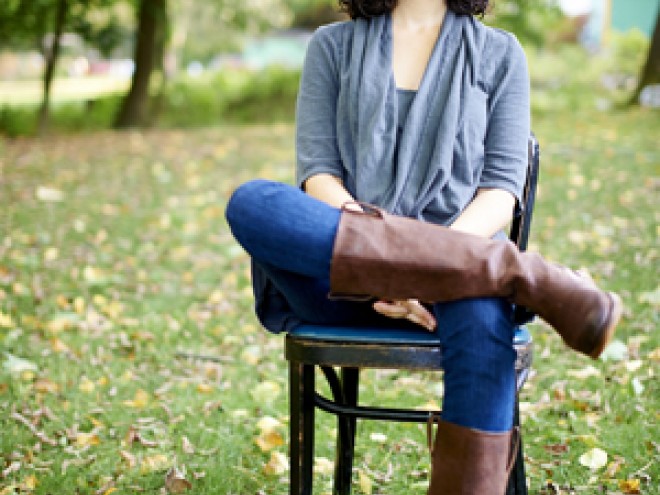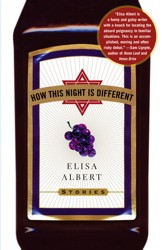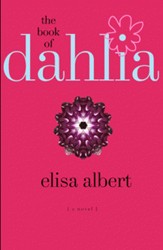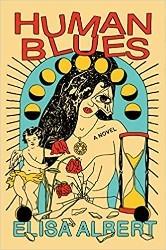Elisa Albert is the author of the novels After Birth and The Book of Dahlia, the short story collection How This Night is Different, and editor of the anthology Freud’s Blind Spot. She is a 2009 Sami Rohr Prize Fellow and will be blogging here all week for Jewish Book Council’s Visiting Scribe series.
People frequently ask us where a given novel came from, as though novels have clear origin stories (well, the daddy novel and mommy novel love each other very much, and they do a very special hug…). There is, alas, no simple way to answer this kind of question. I’m not trying to be coy or evasive when I shrug and change the subject, I promise. It’s just, well, how much time do you have?
Novels are noble and doomed attempts to answer very long, impossibly broad, and childish-in-the-best-sense questions. Why do we have to die? What’s up with this man versus nature thing? Why don’t I feel what I’ve been instructed to feel? Why do I love someone who doesn’t love me back? Why do we lie? Why can’t I stop thinking about X, Y, Z? Novels hopefully beget new, unpredictable questions, which echo long after you’re done reading. Novels are smarter than their authors. Novels are woven from almost untraceable sources. Novels sometimes reveal more than we wish they would. I think novels are magic that way. Good novels, that is, but “good” is subjective, so feel free to get angry and wag your finger in my face at a reading! Happens all the time.
I’m a voracious consumer of culture, but only what I absolutely want to consume. I feel no compunction to keep up with what anyone else thinks is important unless it speaks– no, shouts—directly to me, wherever I happen to be. The alchemy of how we find our way to connection with particular works of art at different times in our lives is not subject to will, untold eyeballs on social media notwithstanding. Timing is everything.
I went to a party at a writer’s apartment once, and the floor-to-ceiling bookshelves were filled with every pristine hardcover novel the New York Times had reviewed over the prior decade. Most of the spines hadn’t been cracked. Mere set dressing, alas. It made me sad.
In a perfect world, our bookshelves would be idiosyncratic, singular as fingerprints. Each inner life fed a steady diet best suited to its unique metabolism. That way, finding commonalities on a friend’s bookshelf would mean a lot, wouldn’t it?
Anyway, sometimes I like things I’m “supposed to” like, more often I don’t; I’m not averse to trash, and it’s been a very long time since I forced myself to finish a book that does nothing for me. As a novelist, every single thing I read, hear, and watch goes into the stew. I can’t trace or diagram precisely how, but trust me. So, while what went into After Birth is by now long gone, blessed and ephemeral as eye contact on the subway, there’s a new novel in the offing, and it demands to be fed.
Herewith, a brief and somewhat random consumption survey of late. The next novel should be ready in, oh, shall we say three years? (I’ll aim for that, unless fate intervenes. The uterus is a mysterious joker.) Regardless, it all goes into the pot, and hopefully the stew will be tasty.
- Amy Poehler’s memoir Yes Please. Adorable, if a bit of a bummer in making light of interventionist birth trauma and fear. Mostly adorable. Of her many accomplishments, the Upright Citizens Brigade is especially admirable. I love how she describes being asked by chirpy pseudo-friends, as her career begins to take off, “Can you believe it?” Yes, she deadpans. I can believe it. I’ve been working my butt off for years.
- HuffPo article about addiction and connection, specifically a fascinating new rat study that seems to trace the roots of addiction not to the chemical grip of substances themselves but to lack of connection and community, which makes so much sense. I like to refer to these kinds of revelatory studies, confirming our most primal instincts, as Bears Still Shitting In The Woods.
- Ani DiFranco show at the Egg in Albany. I’ve been to maybe thirty Ani DiFranco shows since my fellow Rohr Prize nominee and former camp counselor Ari Y Kelman introduced me to her music at Camp Ramah circa 1992. (Thank you forever, Ari.) It’s been thrilling to witness her evolution over the years, and more than a little uncanny to be aware of my own in relation. I brought my husband along to this one. He was a great sport, especially given the, ahem, intensity of crowd, the sing-along aspect, and my tears of joy throughout.
- “Broad City.” Adore this show. Makes me nostalgic for being young and careless in NYC. (But not too nostalgic.) What insouciant hilarity. “There’s no need to stress,” in the wise words of Ilana Glazer.
- “Wild,” the movie. Woman versus nature: what an idea. Beautifully done. Great story.
- Surely You’re Joking, Mr. Feynman! This was one of my brother David’s favorite books. It’s been more than sixteen years since he died, and when a friend happened to recommend it, I realized: hey, it’s about time I read that. Delightful. I can feel David absolutely all over it. Reading very slowly so it lasts as long as possible.
- Our Andromeda by Brenda Shaughnessy. A collection of poetry from a scarily brilliant poet. This conversation about the book between poets Joy Katz and Erika Meitner is an excellent examination of what Shaughnessy is up to. Devastating and celebratory and a welcome reminder of what poetry can do.
- Us Weekly magazine. Just read on the train because I’m tired and truth be told tabloids relax me like a hot fragrant bath. Should I buy The New York Times instead? A cursory glance at the front page reminds me that I will be crying and/or buzzing with rage/fear/hopelessness if I involve myself too deeply with its contents, so… Us Weekly it is. I no longer recognize half the celebrities featured therein, which weirdly does little to lessen my total enjoyment of this dumb rag.
- Ruth Fowler’s piece on Al Jazeera America, which offers an important overview of exactly what’s going ever so wrong with our society’s treatment of childbearing women. I’m grateful for Fowler’s ongoing confrontation of misogynistic taboos regarding women’s bodies in birth.
- Rebbe, by Joseph Telushkin. I grew up with Telushkin’s books, and was curious to know more about Schneerson. What a delight to find, in this engrossing portrait, a riveting human being whose insight, intellect, and infallible ability to connect changed the face of world Jewry forever, one yechidus at a time. I happened by the Chabad Sukkah in Washington Square last fall, and felt compelled to duck in and say the blessings. The three young orthodox men inside were friendly but slightly robotic until I asked them if they’d read Rebbe. Then they stopped what they were doing, looked at me with surprise, and agreed: what a phenomenal book, what a phenomenal biographer, what a phenomenal subject. We probably didn’t have much else in common, me and those boys in the sukkah, but we connected for a minute, and exchanged genuine good wishes, as I went on my way I felt uplifted by our shared appreciation of Telushkin’s achievement, and renewed in the certainty that art and literature have the potential to unite us all, sooner or later, one way or another, if only we let it.
Read more about Elisa Albert here.
Related Content:
- Reading List: Elisa Albert
- Visiting Scribe Essays: Reading Lists, Literary Connections and Influences
- Reading List: Joseph Telushkin
Elisa Albert is the author of After Birth, The Book of Dahlia, How This Night Is Different, and editor of the anthology Freud’s Blind Spot. Her stories and essays have appeared in Time, The Guardian, The New York Times, n+1, Bennington Review, Tin House, Michigan Quarterly Review, The Literary Review, the Los Angeles Review of Books, and elsewhere. She lives in upstate New York.



